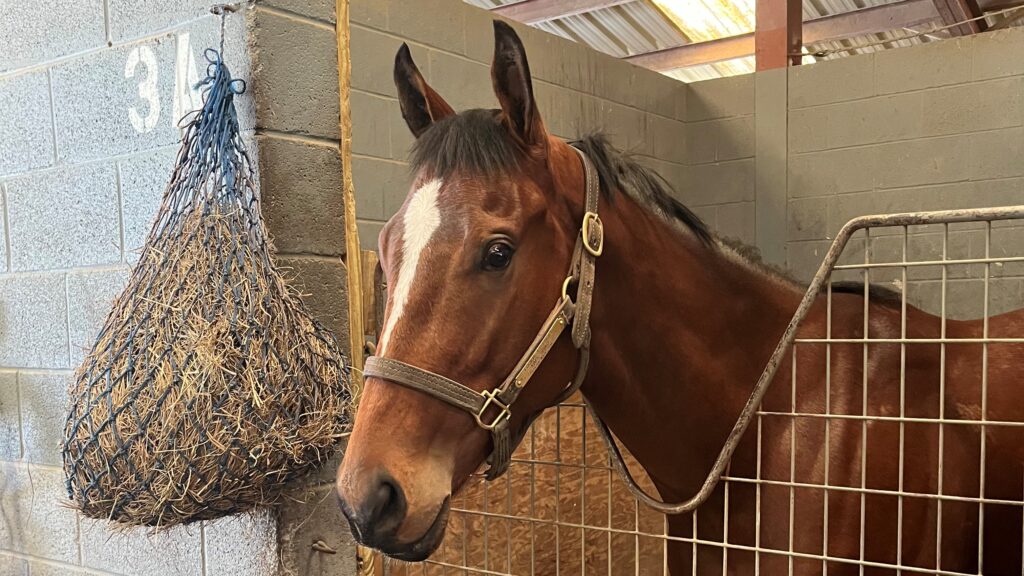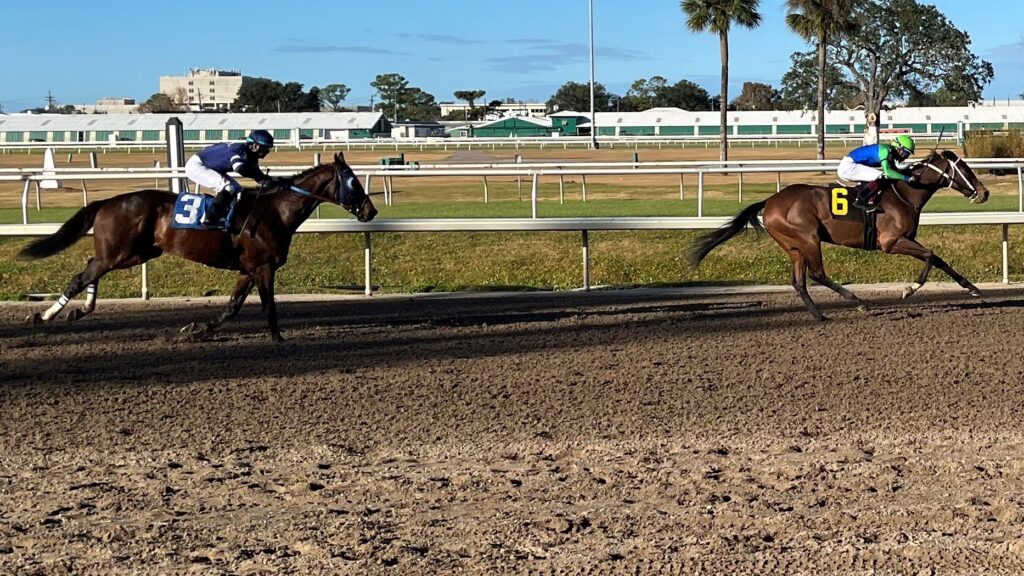Last updated: May 3, 2025
Maiden claiming races are a unique and challenging type of horse race that can be very rewarding for bettors who know how to handicap them effectively. These races feature horses that have never won a race, and they are often claimed by other trainers during the race.
This means that the horses in a maiden claiming race can be very unpredictable, and it is important to consider various factors when handicapping them.

Factors to Consider When Handicapping Maiden Claiming Races
- Pedigree: A horse’s pedigree can give you insight into its potential ability. Look for horses with sires and dams with a good record of producing winners. However, remember that pedigree alone isn’t a guarantee of success, especially in maiden claimers where inexperience can sometimes overshadow raw talent.
- Trainer: The trainer of a horse can also be a good indicator of its potential. Look for trainers who have a good record of success with maiden claimers.
From my experience: I always pay close attention to trainers known for their patient approach with young horses. Some trainers rush horses to the races before they’re truly ready, while others meticulously develop their stock. A trainer’s past performances with similar horses can reveal a lot about their approach.
Workout patterns
A horse’s workout patterns can give you valuable insight into its fitness and current form. Look for horses that have been working out consistently and improving their times.
Delving deeper: It’s not just about fast times; it’s about the pattern of workouts.
Positive workout patterns to look for:
- Progressively faster times at increasing distances: This shows the horse is getting fitter and building stamina, which is crucial for longer races.
- A recent “bullet” workout: This is the fastest workout at a particular distance on a given day at that track, suggesting the horse is in peak form.
- Consistent workouts at the race distance: This indicates the horse is specifically prepared for the distance of the upcoming race.
- “Breezing” workouts: These are typically strong workouts where the horse is asked to extend its stride and show its speed.

Negative workout patterns to be cautious of:
- Inconsistent distances: If a horse is working at vastly different distances each time, it may indicate a lack of focus or specific preparation for the race.
- Slowing times: Declining workout times could suggest the horse is not in top condition or experiencing some setback.
- Missed workouts: Gaps in a horse’s workout schedule can be a red flag, potentially indicating an injury or other issue.
- “Dull” workouts: If the notes indicate the horse was sluggish or unenthusiastic during the workout, it could indicate a lack of fitness or motivation.
How to read workout information: Workout details are usually listed in the past performance charts. Focus on recent workouts at distances similar to the upcoming race. Look for progressively faster times and any notes on the horse’s performance.
You can find a horse’s workout information, at Equibase: Your comprehensive source for horse racing data, statistics, and race results.
Remember:
- Workouts are just one piece of the puzzle. Always consider them in conjunction with other factors like pedigree, trainer, and past performances.
- Pay close attention to recent workouts, as they are the most indicative of a horse’s current form.
- Be aware of track biases. Some tracks favor horses with certain running styles or those coming from specific workout patterns.
By understanding workout information and incorporating it into your handicapping strategy, you can better understand a horse’s fitness and potential, increasing your chances of finding those hidden gems in maiden claiming races.
Jockey
The jockey of a horse can also play a role in its success. Look for jockeys who have a good record of riding maiden claimers.
Insider tip: Some jockeys excel at getting the best out of inexperienced horses. They possess a knack for settling nervous first-time starters and making smart tactical decisions during the race.
- Post position: The post position of a horse can give you some insight into its chances of winning. Some post positions are more advantageous than others, depending on the track and the distance of the race.
- Track conditions: The track conditions can also affect the outcome of a race. Consider the weather conditions and the condition of the track surface when handicapping a race.
Remember: Some horses thrive on a muddy track, while others struggle. Pay attention to a horse’s past performances on different track conditions to identify any potential biases.
- Visual observations: If possible, watch the horses in the paddock and warm-up to assess their physical condition and demeanor.
From the backside: I’ve learned a lot just from watching horses before a race. A horse that’s prancing and full of energy might be too keyed up for its debut, while one that’s calm and focused could be ready to fire.

Tips for Handicapping Maiden Claiming Races
- Look for horses dropping in class or making their first start for a new trainer. Data suggests that horses making this class drop tend to have a higher success rate, making it a pivotal strategy when handicapping these races.
- Analyze past performances of similar horses from the same trainer or barn.
Trainer tendencies: Some trainers excel at getting horses ready to win first time out, while others prefer to give their horses a few races to develop. Recognizing these patterns can be invaluable.
- Pay attention to horses with trouble lines in previous races, indicating they may have more potential than their record suggests.
- Consider the pace of the race and how it might favor certain running styles.
My approach: I always try to envision how the race will unfold. Will it be a fast early pace, setting up for a closer? Or will it be a slow pace, favoring horses with early speed?
- Use handicapping tools and resources like past performance data, speed figures, and expert analysis.

Leveraging Second-Time Starter Insights
From the trenches: As someone who has run many horses in maiden claiming races, I’ve found that second-time starters offer unique handicapping opportunities.
The first race can be overwhelming for a young horse, leading to “jitters,” where their performance may not reflect their true potential. Once they have that first race behind them, these horses often settle down and significantly improve in their next outing.
When handicapping second-time starters, I pay close attention to those with solid workout histories, as they can offer great value. Key patterns to look for include:
- Early speed, then faded: This could indicate they have the ability but need more racing experience to sustain their effort.
- Trouble at the start or during the race: A poor start or bumping incident can ruin a horse’s chances. Look for horses that had legitimate excuses in their debut.
- Strong finish, but too far back early: This could suggest they have the talent to run well but need to learn to be more forwardly placed.
A case in point: I once claimed a filly for $5,000 who finished a distant fifth in her debut despite showing promise in the mornings. I noticed she had a troubled trip, getting bumped at the start. In her second start, I entered her in a $10,000 claiming race where she ran a strong third.
Confident in her ability, I dropped her back down to a $5,000 claimer for her next race, and she won impressively. This experience highlights the potential rewards of identifying and capitalizing on a horse’s improvement after their debut race.
Of course, it’s important to remember that not every second-time starter will show dramatic improvement. Factors like equipment changes, distance changes, and the horse’s individual temperament can all play a role.

The Claiming Process and Its Impact on Handicapping
Maiden claiming races introduce a unique dynamic: the claiming process itself. During these races, any horse can be “claimed” or purchased for a predetermined price set before the race. This can significantly influence the race’s outcome and your handicapping strategy.
- Motivation to Win: A horse entered at a lower claiming price than its perceived value might be “protected” by its connections, meaning they’ll try to win and avoid losing the horse at a bargain. Look for subtle clues like a top jockey on a seemingly outclassed horse.
- Drop in Class: Conversely, a horse dropping significantly in claiming price might indicate the connections believe it’s not competitive at its previous level. However, a class drop can sometimes be just the spark a horse needs to improve.
- “Hidden” Talent: Trainers occasionally enter talented horses in maiden claimers at lower prices to try and sneak a win before the horse’s true ability is revealed. These horses can be hard to spot but offer huge potential payouts if identified.
My experience: I’ve claimed many horses out of maiden claiming races over the years, and I always consider the claiming angle when handicapping. It’s a bit of a chess match, trying to anticipate the intentions of other trainers and owners.
Common Handicapping Mistakes to Avoid
Maiden claiming races, with their mix of inexperience and potential for claiming, can be a minefield for even seasoned handicappers. Here are a few common pitfalls to avoid:
- Overvaluing Pedigree: While a strong pedigree is a plus, it’s not the be-all and end-all in maiden claimers. Inexperienced horses often haven’t fully developed their potential, so focus on current form and improvement.
- Ignoring Workouts: Don’t underestimate the importance of workout patterns. A horse with consistently strong workouts, especially at the race distance, is signaling readiness, even if its past performances are lackluster.
- Chasing Speed Figures: While speed figures are helpful, they’re not always reliable in maiden claimers. Young horses can improve rapidly, making past speed figures less relevant. Consider the overall context and recent trends.
- Ignoring Trouble Lines: A horse’s past performances might show poor results, but trouble lines (denoted by symbols in the racing program) can reveal hidden potential. A horse that was repeatedly blocked or had a poor trip might be much better than its record indicates.
- Betting Favorites Blindly: Favorites in maiden claiming races win at a lower rate than in other types of races. Don’t be afraid to look for value in longer shots with improving form or positive trainer/jockey angles.
By avoiding these common mistakes and incorporating the tips and insights discussed throughout this article, you can approach maiden claiming races with a more informed and strategic mindset.

FAQs About Maiden Claiming Race Handicapping.
Here are some common questions people ask me about handicapping maiden claiming races.
What Makes Maiden Claiming Races Different from Other Claiming Races?
Maiden claiming races are specifically for horses that have never won a race, adding an extra layer of unpredictability due to the inexperience of the horses.
How Can I Improve My Chances in Maiden Claiming Races?
Focus on evaluating potential improvement, especially in lightly raced horses, and pay close attention to trainer patterns and class drops.
Why Are Maiden Claiming Races So Unpredictable?
The horses’ inexperience, combined with the potential for claiming, adds a level of uncertainty that makes these races more challenging to handicap.
Should I Bet on First-Time Starters in Maiden Claiming Races?
First-time starters can be profitable bets if they show strong workout times, have a good pedigree, and are handled by a trainer with a good record in maiden claiming races.
Conclusion
Following these tips can increase your chances of success when handicapping maiden claiming races. Remember that handicapping is a complex skill, and there is no guaranteed way to win every race. However, by doing your research and using the information in this article, you can give yourself a better chance of making informed decisions and finding winning horses.
Now, it’s your turn! Have you succeeded with second-time starters or other unique angles in maiden claiming races? Share your stories and strategies in the comments below – let’s learn from each other and continue to improve our handicapping skills.
Helpful Sites for Gamblers
For those looking to deepen their understanding of gambling or seeking resources to improve their betting strategies, here’s a list of sites that offer valuable information, tips, and support:
- Equibase (www.equibase.com): Your comprehensive source for horse racing data, statistics, and race results.
- Horse Racing Sense (www.horseracingsense.com): Offers insights into horse racing equipment, strategies, and tips for bettors.
- BloodHorse (www.bloodhorse.com): Provides news, analysis, and statistics for thoroughbred racing enthusiasts.
- Racing Post (www.racingpost.com): A go-to for horse racing news, cards, and results in the UK and Ireland.
- Gamblers Anonymous (www.gamblersanonymous.org): A support group for people who want to stop gambling.
- National Council on Problem Gambling (www.ncpgambling.org): Offers support and resources for problem gambling and its prevention.
Gambling Warning
While gambling can be an enjoyable form of entertainment for many, it’s important to approach it responsibly. Here are some key considerations:
- Know Your Limits: Only gamble with money you can afford to lose. Setting a budget and sticking to it is crucial.
- Understand the Risks: Gambling involves a high level of risk and uncertainty. Be prepared for the possibility of losing.
- Recognize Problem Gambling Signs: If gambling is causing stress, financial strain, or affecting your relationships, it may be time to seek help.
- Seek Support: If you or someone you know has a gambling problem, resources like Gamblers Anonymous and the National Council on Problem Gambling can provide support and guidance.
Remember, the goal of gambling should be entertainment, not a way to make money. Betting wisely and responsibly ensures it remains a fun and safe activity.

About the Author: Miles Henry
Lifelong Horseman | Racehorse Owner | Published Author
Miles Henry brings over 25 years of hands-on experience training and owning Thoroughbred racehorses. Raised with Quarter Horses and Appaloosas, he’s spent a lifetime learning from horses—on the track, in the barn, and in the field. Today, he runs a small but successful racing stable in Louisiana and shares real-world insights on HorseRacingSense.com, helping horse owners, fans, and bettors navigate the sport with confidence.
📚 Books: View Miles’s books on Amazon »
🎧 Podcast Guest: Animal Tales Ep. 32 |
YouTube Interview
📩 Newsletter: Sign up for racing tips and horse care advice »
🔗 Follow Miles:
Twitter |
Facebook |
YouTube

